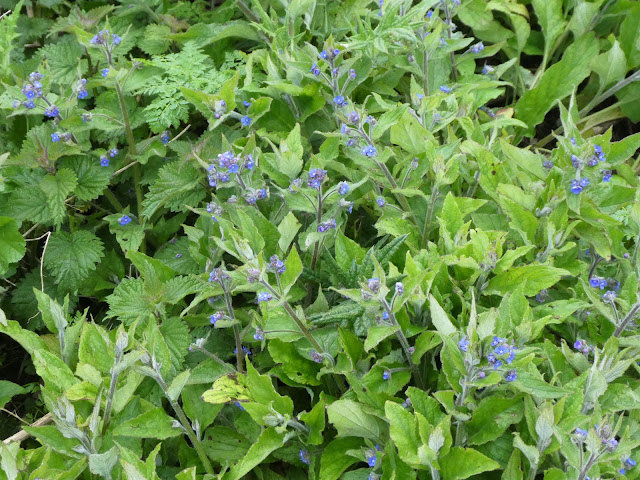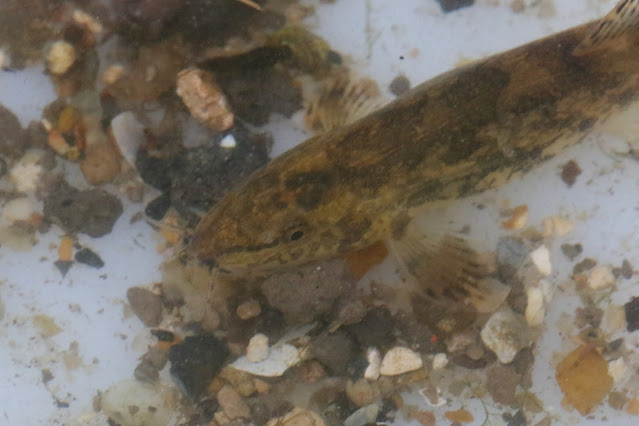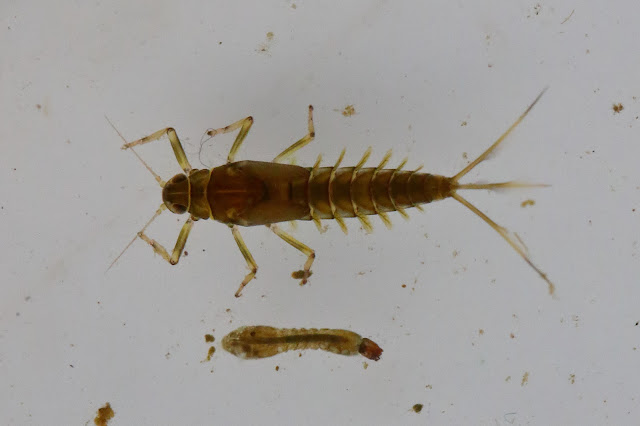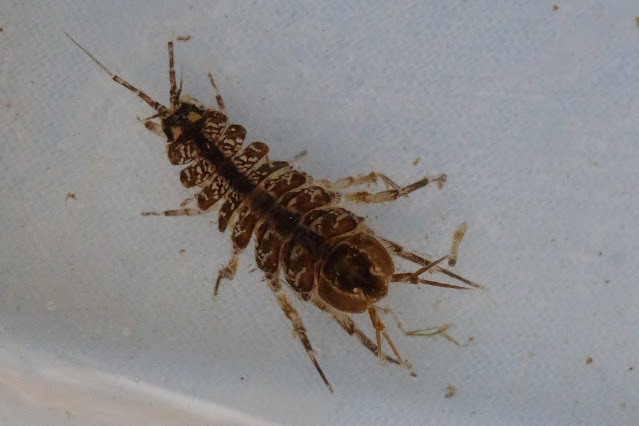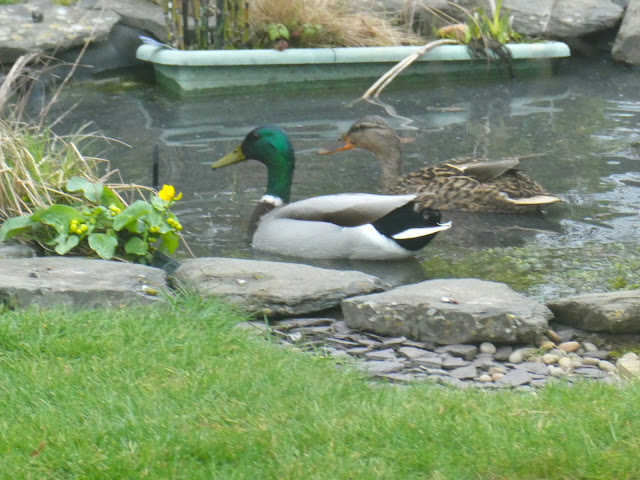27th April 2024 - despite the unseasonal weather, David F braved a walk in Sluice Wood, and was rewarded with lovely displays of both Wood Forget-me-not and Green Alkanet.
Sightings and news for the Naturewatch group of Great and Little Abington in Cambridgeshire, UK. See below for more details and information on how to join.
Saturday, 27 April 2024
NatureWatch trip to Fowlmere - and the first Cuckoo!
24th April 2024 - the Abington NatureWatch trip to RSPB Fowlmere was attended by just four members.
Despite being a little chilly, the group saw and heard a good variety of birds, the highlight being lovely views of a Cuckoo, flying close by before landing and calling from a nearby tree - the first of the year! Both Swallow and Sparrowhawk were seen from the reedbed hide, and six species of warbler were seen or heard, including Lesser Whitethroat, Reed Warbler and Willow Warbler. Along the stream there were fabulous views of a Water Vole happily feeding on the river vegetation, totally undisturbed by our presence, as well as a female Mallard and a duckling. Then finally, a Marsh Harrier was seen above the reeds from Drewer's Hide.
Garlic Mustard and Mining Bees
23rd April 2024 - David F noted prolific amounts of Garlic Mustard in flower in Sluice Wood, as well as a loose colony of the solitary Tawny Mining Bee.
River Sampling results
22nd April 2024 - the Abington NatureWatch Rivercare team met at the river by the ford this week for the first river sampling session of the season. Having captured a 'kick-sample' of the wildlife in the net, and carefully transferred it to a bucket, the task was to count and identify the creatures in the river. This data is then sent to Riverfly for monitoring and analysis.
A good variety of creatures were found, including three fish - two Minnow, nicely coloured ready for the breeding season, and a Stone Loach. Interestingly a Water Hog Louse was also found, something the group had not seen recently.
Dark-edged Beefly
17th April 2024 - this Dark-edged Beefly was spotted by Joan N in her garden recently, darting quickly between flowers, only briefly hovering to feed on nectar - so it was no mean feat to capture this lovely photo.
Freshly Fledged!
17th April 2024 - Andy M was very happy to see three newly fledged Robin being fed by an adult under his garden feeders this week.
Wednesday, 10 April 2024
A few flowers along the footpath
10th April 2024 - whilst walking along the footpath from Pampisford Rd to the High St, Andy M spotted a good clump of Common Comfrey in fine bloom, as well as a patch of Green Alkanet (which in fact has blue flowers!) and White Dead Nettle.
NEWS - first Swallow
10th April 2024 - NEWS! The first Swallow was reported today in the Abingtons, flying low over the fields south of Chalky Road, and heading north!
Do keep a look out for our summer arrivals, and let Derek T know when you spot them.
Arriving Warblers along the ORC
10th April 2024 - the Chiffchaff are generally the earliest warbler to arrive in the UK, the first one being seen in the Abingtons on 10th March this year, and then arriving en masse shortly afterwards such that they can now heard singing from almost every bush it seems! A little later, on 23rd March, the first Blackcap was heard in the village, and these too can now be heard singing from hedgerows all around the village. Both these warblers arrive in the UK from southern Europe, whereas the Willow Warbler travels here from sub-Saharan Africa, thus arriving a little later, with two heard singing today, 10th April. Andy M
Early butterflies
10th April 2024 - most butterfly species seen flying early in the year are those that survive the winter as adults by hibernating in a sheltered spot, such as the Red Admiral and Peacock, seen recently along the ORC by Andy M.
Spring Flowers on Granta Park
7th April 2024 - Andy M noted a few of the flowers in bloom currently around GP. The Garlic Mustard was everywhere in the woods around the Sluice, where a few late Celandines were also in flower. The Wild Arum plants were a good size by now, and many contained the 'flowering' spikes. Lower down, the Ground Ivy and Common Storksbill were very much on show, and on the meadow the Cowslip were really putting on a good show, whilst the large number of Bee Orchid leaf whorls again promises a fine show of flowers later in the year.
Saturday, 6 April 2024
March 2024 - Summary of Sightings around the Abingtons
March 2024
Amphibians
and Reptiles
Frogspawn - four
sightings this month, in ponds on Lewis Cres (4th), Chalky Rd (6th), Linton Rd
(17th) and South Rd (19th). No sightings of newts or toads.
Birds
A total of 56 species were
reported this month in 496 records from 14 reporters. A flock of Waxwing were
seen on Bourn Bridge Rd, both Lesser Redpoll and Siskin were spotted in gardens,
and Chiffchaff arrived in numbers around mid-month.
Excitingly, a flock of
around 12-15 Bohemian Waxwing was spotted feeding on cotoneaster
berries along Bourn Bridge Rd on 10th (see
blog, and April parish newsletter). Being winter visitors to the UK, this
species has arrived here in good numbers this year.
Also winter visitors
to the UK, small numbers of Lesser Redpoll were seen along the High St
and in Lewis Cres mid-month, and up to 5 Siskin were seen on feeders at
several locations throughout the month (see
blog). A flock of 15 Fieldfare
were seen on the Perse sports fields on 12th, and smaller numbers of Redwing
continued to be reported from several sites.
The first summer
visitors arrived, with Chiffchaff being reported in good numbers, the first
being on Cambridge Rd on 14th, followed by reports of singing birds from multiple
locations over the next week. Blackcap were also heard singing at
several locations from 23rd.
Red-legged Partridge
were seen in several gardens around Bourn Bridge Rd, and two Grey Partridge were
seen in fields along the Roman Rd.
On the still flooded Hood’s
Meadow (10th), around 40 Black-headed Gull, 6 Common Gull and a Lesser-backed
Backed Gull were seen, as well as Mallard and two pairs of Mandarin
Duck. On GP lake, Canada Goose
and Greylag were reported, as well as two Cormorant and a Little
Grebe. A Grey Heron and Moorhen were also seen there.
Buzzard were commonly
spotted, with four reported soaring above Bourn Bridge Rd on 7th, where three Red
Kite were also seen. A Kestrel was seen four times, and a Tawny
Owl was frequently heard around Hall Farm.
Blue Tit, Great
Tit and Coal Tit were all reported on feeders, and both window-tapping
and a courtship display involving the offering of feathers was witnessed
between a pair of Long-tailed Tit (see
blog). Groups of 6-8 Goldfinch, Greenfinch and Chaffinch
all were reported, and Robin, Wren and Dunnock were all heard singing. A Goldcrest was seen at Hall Farm and
on Cambridge Rd, and both Magpie and Jay were seen in several
gardens.
Song Thrush
could be heard singing most days, and a Mistle Thrush was also heard on
Lewis Cres on 21st. Along the ORC, both Yellowhammer
and Skylark were singing, as were Reed Bunting around the GP lake.
Pied Wagtail were seen at several locations, including 16 feeding on the
Perse sports fields. A Great Spotted Woodpecker was heard drumming in
South Grove on 20th, and Green Woodpecker were also heard.
Butterflies
and other Insects
A total of 28
butterfly sightings were reported in March, with 17 of those being a Brimstone,
seen throughout the month. A Comma was reported twice, the first of
these on the 14th being the first sighting this year. A Peacock was spotted
three times, and a Small White was reported once, all towards the end of the
month.
There were sightings
of both Buff-tailed Bumblebee and Red-tailed Bumblebee throughout
the month, with a Tree Bumblebee being spotted on Cambridge Rd on 23rd,
and both Tawny Mining Bee and Hairy-footed Flower Bee being seen
on Lewis Cres on 30th.
Dark-edged Beefly
were also seen twice, and Harlequin Ladybird inside a house on Church
Lane.
Mammals
Bat – two in a
Cambridge Rd garden on 31st, possibly Pipistrelles.
Fox – one spotted
in Hood’s Meadow on 10th.
Hedgehog – two
have been captured on a trail camera regularly throughout the month in a Bourn
Bridge Rd garden, and one was seen in a Linton Rd garden on 17th.
Muntjac – two in
Lagden’s Grove on 10th, two on Perse playing fields also on 10th, and one seen
in a Cambridge Rd garden on 31st.
Roe Deer –
seven were seen in a field off the A1307 adjacent to Cambridge Rd on 25th.
Weather
At last, a month of
average rainfall with only 44.5 mm! The lowest temperature was minus 1.8
degrees on the 4th, and the highest being 19.5 degrees on the 30th. Winds were
generally from a southeast or westerly direction.
ANW
Programme
Dates for your diaries - the NatureWatch 2024 Programme of activities
and trips is now on
the blog.
Barry Brooks, Peter Brunning, David & Gaynor Farrant, Carolyn Hannah, Robin Harman, Carole McCrae, Len Mead, Andy & Polly Merryweather, Mary Miles, Sam Murphy, Joan Nevin, Nancy Ockendon, Freda Orgee, Pam and Brian Parris, Barbara Phippen, Gill Smith, Maggie Turner, Derek Turnidge.
Peacock butterfly
30th March 2024 - David F spotted this rather splendid Peacock butterfly in his garden recently.
Peacocks are one of the butterfly species that can overwinter as adults in the UK, emerging from their sheltered spots on warmer spring days.
Hybrid Cowslip
Dozy Bumblebee
29th March 2024 - Emma J came across this somewhat dozy Buff-tailed Bumblebee on a fallen flower. Being a little chilled, it seemed unable to move, so Emma transferred it to a nearby flowering shrub where it could top up on nectar.
The Aims of Abington Naturewatch
At their meeting on 9 April 2005 the members approved this revised version of the aims of Abington Naturewatch:
- To monitor and record the wildlife (fauna & flora) within the borders of the Abingtons;
- To encourage protection of our wildlife, maintain its quality and foster its diversity;
- To promote awareness of the richness, potential and problems of the natural environment of the Abingtons;
- To cooperate in improving access to the local natural environment for the benefit of all Abington villagers.
The organisation is informal and communication is by email if possible; members are notified of events from time to time. Contact details are maintained by a small "project team". There is currently no membership fee as costs are covered by voluntary contributions at events.
Members are encouraged to report notable sightings of flora and fauna within the Abingtons to the appropriate sector coordinator and an illustrated record is published annually.
A map of the area covered, with some features noted, is available here: http://maps.google.co.uk/maps/ms?ie=UTF8&hl=en&msa=0&msid=213774935674882866424.00000111dca2be9f06ab8&z=13>
For more information or to join, please contact David Farrant on (01223) 892871.
Contributions to our records should be sent to sector contacts or either of the above. Photographs may also be submitted to Andy Merryweather (amerryweather61@gmail.com)

